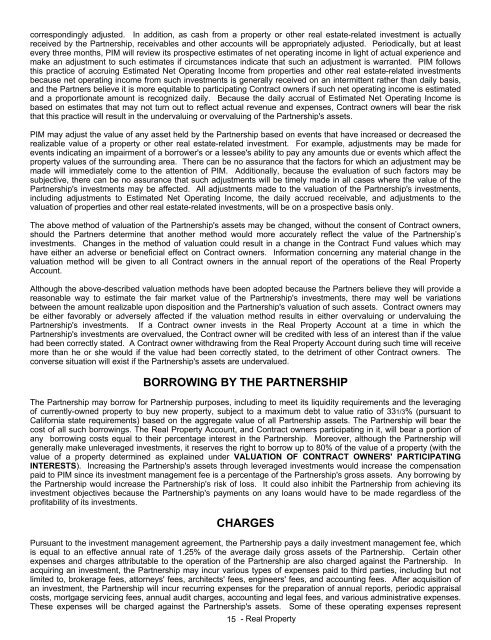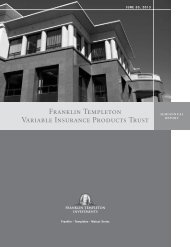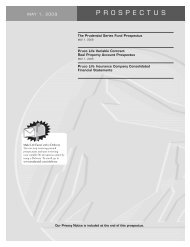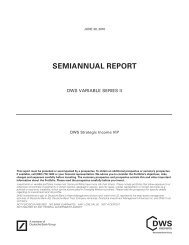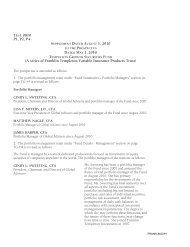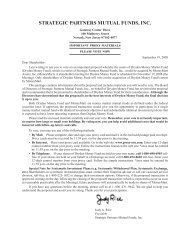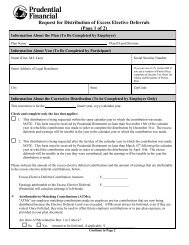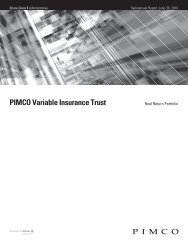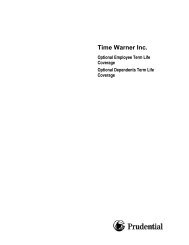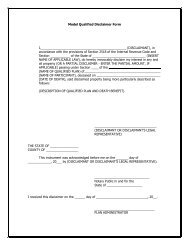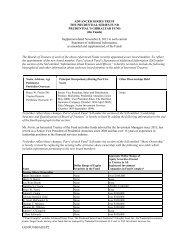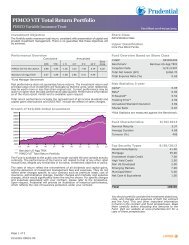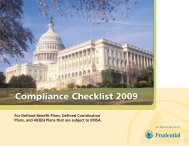The Prudential Series Fund
The Prudential Series Fund
The Prudential Series Fund
You also want an ePaper? Increase the reach of your titles
YUMPU automatically turns print PDFs into web optimized ePapers that Google loves.
correspondingly adjusted. In addition, as cash from a property or other real estate-related investment is actually<br />
received by the Partnership, receivables and other accounts will be appropriately adjusted. Periodically, but at least<br />
every three months, PIM will review its prospective estimates of net operating income in light of actual experience and<br />
make an adjustment to such estimates if circumstances indicate that such an adjustment is warranted. PIM follows<br />
this practice of accruing Estimated Net Operating Income from properties and other real estate-related investments<br />
because net operating income from such investments is generally received on an intermittent rather than daily basis,<br />
and the Partners believe it is more equitable to participating Contract owners if such net operating income is estimated<br />
and a proportionate amount is recognized daily. Because the daily accrual of Estimated Net Operating Income is<br />
based on estimates that may not turn out to reflect actual revenue and expenses, Contract owners will bear the risk<br />
that this practice will result in the undervaluing or overvaluing of the Partnership's assets.<br />
PIM may adjust the value of any asset held by the Partnership based on events that have increased or decreased the<br />
realizable value of a property or other real estate-related investment. For example, adjustments may be made for<br />
events indicating an impairment of a borrower's or a lessee's ability to pay any amounts due or events which affect the<br />
property values of the surrounding area. <strong>The</strong>re can be no assurance that the factors for which an adjustment may be<br />
made will immediately come to the attention of PIM. Additionally, because the evaluation of such factors may be<br />
subjective, there can be no assurance that such adjustments will be timely made in all cases where the value of the<br />
Partnership's investments may be affected. All adjustments made to the valuation of the Partnership's investments,<br />
including adjustments to Estimated Net Operating Income, the daily accrued receivable, and adjustments to the<br />
valuation of properties and other real estate-related investments, will be on a prospective basis only.<br />
<strong>The</strong> above method of valuation of the Partnership's assets may be changed, without the consent of Contract owners,<br />
should the Partners determine that another method would more accurately reflect the value of the Partnership’s<br />
investments. Changes in the method of valuation could result in a change in the Contract <strong>Fund</strong> values which may<br />
have either an adverse or beneficial effect on Contract owners. Information concerning any material change in the<br />
valuation method will be given to all Contract owners in the annual report of the operations of the Real Property<br />
Account.<br />
Although the above-described valuation methods have been adopted because the Partners believe they will provide a<br />
reasonable way to estimate the fair market value of the Partnership's investments, there may well be variations<br />
between the amount realizable upon disposition and the Partnership's valuation of such assets. Contract owners may<br />
be either favorably or adversely affected if the valuation method results in either overvaluing or undervaluing the<br />
Partnership's investments. If a Contract owner invests in the Real Property Account at a time in which the<br />
Partnership's investments are overvalued, the Contract owner will be credited with less of an interest than if the value<br />
had been correctly stated. A Contract owner withdrawing from the Real Property Account during such time will receive<br />
more than he or she would if the value had been correctly stated, to the detriment of other Contract owners. <strong>The</strong><br />
converse situation will exist if the Partnership's assets are undervalued.<br />
BORROWING BY THE PARTNERSHIP<br />
<strong>The</strong> Partnership may borrow for Partnership purposes, including to meet its liquidity requirements and the leveraging<br />
of currently-owned property to buy new property, subject to a maximum debt to value ratio of 331/3% (pursuant to<br />
California state requirements) based on the aggregate value of all Partnership assets. <strong>The</strong> Partnership will bear the<br />
cost of all such borrowings. <strong>The</strong> Real Property Account, and Contract owners participating in it, will bear a portion of<br />
any borrowing costs equal to their percentage interest in the Partnership. Moreover, although the Partnership will<br />
generally make unleveraged investments, it reserves the right to borrow up to 80% of the value of a property (with the<br />
value of a property determined as explained under VALUATION OF CONTRACT OWNERS' PARTICIPATING<br />
INTERESTS). Increasing the Partnership's assets through leveraged investments would increase the compensation<br />
paid to PIM since its investment management fee is a percentage of the Partnership's gross assets. Any borrowing by<br />
the Partnership would increase the Partnership's risk of loss. It could also inhibit the Partnership from achieving its<br />
investment objectives because the Partnership's payments on any loans would have to be made regardless of the<br />
profitability of its investments.<br />
CHARGES<br />
Pursuant to the investment management agreement, the Partnership pays a daily investment management fee, which<br />
is equal to an effective annual rate of 1.25% of the average daily gross assets of the Partnership. Certain other<br />
expenses and charges attributable to the operation of the Partnership are also charged against the Partnership. In<br />
acquiring an investment, the Partnership may incur various types of expenses paid to third parties, including but not<br />
limited to, brokerage fees, attorneys' fees, architects' fees, engineers' fees, and accounting fees. After acquisition of<br />
an investment, the Partnership will incur recurring expenses for the preparation of annual reports, periodic appraisal<br />
costs, mortgage servicing fees, annual audit charges, accounting and legal fees, and various administrative expenses.<br />
<strong>The</strong>se expenses will be charged against the Partnership's assets. Some of these operating expenses represent<br />
15 - Real Property


